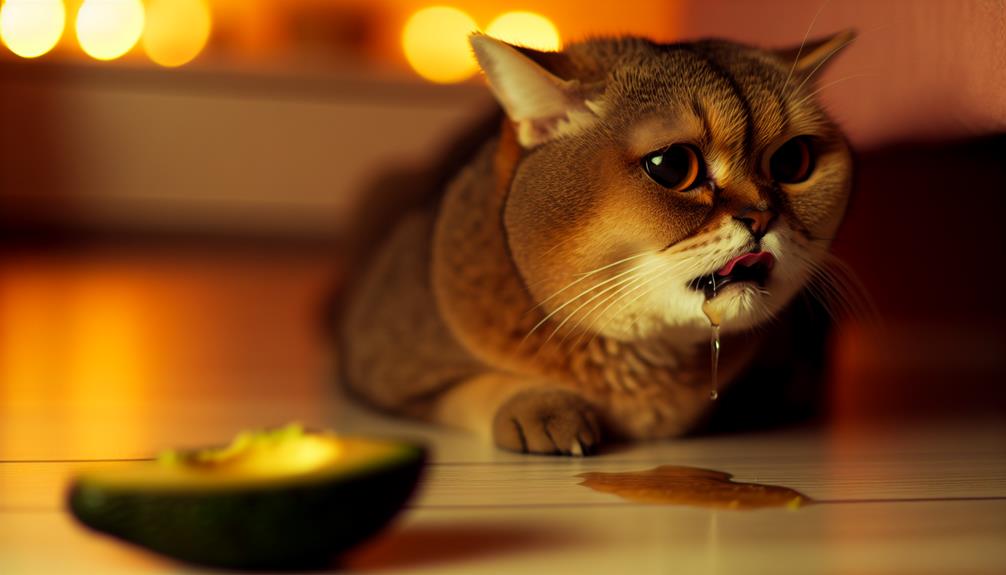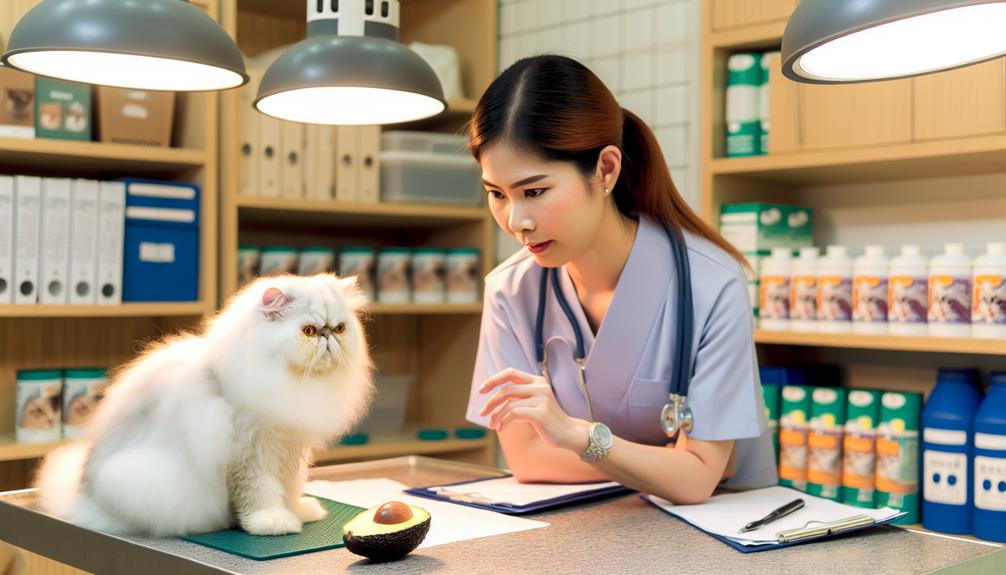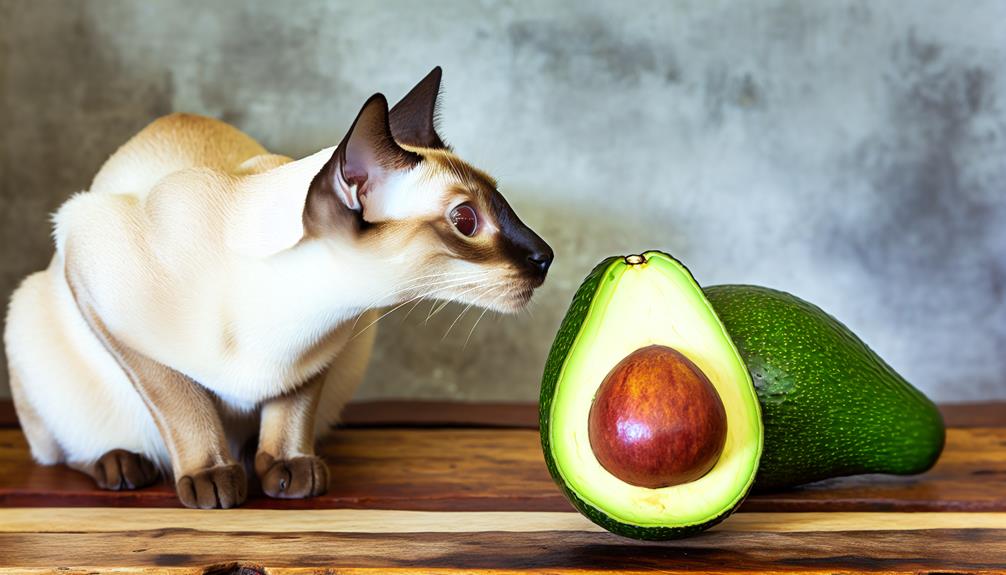You might not know that while avocados are packed with healthy fats and nutrients, they contain a toxin called persin, which can be harmful to cats. Sure, your feline friend might be less susceptible to persin poisoning than, say, birds or horses, but that doesn't mean they're in the clear. The high-fat content in avocados could lead to obesity or even pancreatitis if your cat consumes too much. Plus, there's the choking hazard posed by the avocado pit. So, should you consider safer alternatives for your furry companion? Let's explore this further.
Nutritional Profile of Avocado
Understanding the nutritional profile of avocado is fundamental when considering whether cats can safely consume it. Avocados are renowned for their rich composition of vitamins, minerals, and healthy fats. For feline nutrition, it's essential to break down these components to understand any potential avocado benefits for your cat.
First, avocados are packed with vitamins such as A, B6, C, and E. Vitamin A is critical for maintaining your cat's vision, while Vitamin B6 supports their nervous system and helps in the production of red blood cells. Vitamin E acts as an antioxidant, safeguarding your cat's cells from damage, and Vitamin C, though not necessary for cats as they synthesize it themselves, still contributes to overall health.
Second, avocados contain important minerals like potassium and magnesium. Potassium is vital for muscle function and fluid balance, and magnesium plays a role in enzyme function and energy production. These elements are beneficial, but it's important to assess their necessity within a cat's already balanced diet.
Healthy fats in avocados, particularly monounsaturated fats, are another significant aspect. These fats can support your cat's coat and skin health, providing a shiny, smooth fur. However, remember that cats need a higher proportion of protein and specific fatty acids found in meat, which are more aligned with their natural dietary needs.
Lastly, avocados contain dietary fiber, which aids in digestion and promotes gut health. But cats are obligate carnivores, meaning their primary nutritional needs should come from animal-based proteins rather than plant-based sources. While understanding these avocado benefits is helpful, always consider the specific dietary requirements of felines when evaluating new foods.
Potential Risks for Cats
While avocados boast a range of beneficial nutrients, it's also important to contemplate the potential risks they pose to cats. Despite their health benefits for humans, certain avocado components can be harmful to your feline friend. The primary concern is a substance called persin, which is found in various parts of the avocado, including the skin, leaves, and pit. Though cats are generally less affected by persin compared to other animals, it's not entirely risk-free.
Another issue is the high-fat content of avocados. While healthy fats are essential, excessive consumption can lead to pancreatitis or obesity in cats. Cats' digestive systems aren't designed to handle large amounts of fat, making it vital to monitor their intake.
Moreover, the pit presents a choking hazard. Due to its size and hardness, it can easily become lodged in your cat's throat, leading to severe complications or even death.
Consider these risks when thinking about offering avocados to your cat:
- Potential for Persin Toxicity: Persin can cause gastrointestinal distress and other health issues.
- High-Fat Content: Can lead to obesity or pancreatitis, compromising your cat's health.
- Choking Hazard: The pit can obstruct your cat's airway, posing a lethal threat.
- Digestive Discomfort: Cats may experience vomiting or diarrhea after consuming avocado.
- Allergic Reactions: Though rare, some cats might be allergic to avocado components, leading to severe reactions.
Given these potential risks, it's evident that avocados aren't the safest treat for your feline companion. Always prioritize cat health and consult your veterinarian before introducing any new food into your cat's diet.
Signs of Avocado Toxicity

If your cat has ingested avocado, it's vital to recognize the signs of toxicity promptly. Early detection can make a significant difference in your cat's health and recovery. While not all parts of the avocado are equally harmful, the flesh, pit, and skin can all pose risks. Understanding avocado symptoms and observing changes in cat behavior are essential steps in guaranteeing your pet's well-being.
The first signs of avocado toxicity often manifest as gastrointestinal issues. You might notice your cat vomiting or experiencing diarrhea shortly after ingestion. These symptoms indicate that your cat's body is trying to expel the harmful substances. In more severe cases, your cat could show signs of abdominal pain, which can be identified by unusual postures or vocalizations, such as yowling or excessive meowing.
Another important area to monitor is your cat's respiratory health. Difficulty breathing, coughing, and wheezing can occur if your cat has ingested a significant amount of avocado. These symptoms are particularly concerning and warrant immediate veterinary attention.
Changes in cat behavior can also be indicative of avocado toxicity. Lethargy, weakness, or reluctance to move are alarming signs that your cat's condition is deteriorating. Additionally, you might observe a lack of appetite and increased thirst. These behavioral changes are your cat's way of signaling distress and discomfort.
Lastly, keep an eye on your cat's overall appearance. Swelling, particularly around the head and neck, can be a sign of a severe allergic reaction. If you observe any combination of these avocado symptoms, it's crucial to contact your veterinarian immediately. Prompt action can prevent further complications and guarantee your cat receives the care it needs.
Safe Alternatives for Cats
Noticing the signs of avocado toxicity in your cat can be alarming, but knowing safer food options is equally important for their well-being. When it comes to healthy snacks that suit your cat's preferences, you have a variety of safe alternatives to choose from. These options can provide your feline friend with essential nutrients without the risk associated with avocados.
Safe Alternatives for Cats
- Cooked Chicken: A great source of lean protein, cooked chicken can be a delightful treat for your cat. Make sure it's plain, without any seasoning or additives.
- Canned Pumpkin: Rich in fiber, canned pumpkin can help with digestive health. This is especially useful if your cat has issues with constipation.
- Blueberries: These small fruits are packed with antioxidants and can be a tasty, occasional treat. They are not only healthy but also appealing to many cats.
- Cooked Eggs: High in protein and essential amino acids, cooked eggs can be a nutritious addition to your cat's diet. Remember to cook them fully to avoid any risk of bacterial contamination.
- Green Beans: Low in calories and high in fiber, green beans can be a satisfying snack. They can be particularly beneficial for overweight cats.
Offering these healthy snacks allows you to cater to your cat's preferences while ensuring their safety and nutritional needs are met. Always introduce new foods gradually and consult your vet if you have any concerns about your cat's diet. By providing these safe alternatives, you can keep your feline friend happy and healthy without the worry of avocado toxicity.
Expert Veterinary Opinions

Gaining insights from expert veterinary opinions can be invaluable when it comes to your cat's diet and overall health. Veterinarians often highlight the importance of understanding the potential risks and benefits of introducing new foods, such as avocados, into your feline's diet.
Some experts acknowledge that avocados do offer nutritional benefits. They contain healthy fats, vitamins E and B6, and fiber, which can be advantageous for humans. However, when it comes to feline digestion, the scenario is quite different. Cats have a unique digestive system specifically adapted for a high-protein, low-carbohydrate diet. This means that while certain elements of avocado might seem beneficial, they may not be processed effectively by your cat's digestive system.
Veterinarians often caution against feeding avocados to cats due to the presence of persin, a fungicidal toxin. Even though cats are less susceptible to persin poisoning compared to other animals, ingestion in large quantities or over extended periods could lead to gastrointestinal distress, including vomiting and diarrhea. This kind of disruption in feline digestion can lead to dehydration and more severe health issues.
Expert veterinary opinions emphasize that the potential avocado benefits do not outweigh the risks involved. Instead, they recommend sticking to a diet specifically formulated for cats. Commercial cat foods are designed to meet all of your feline's nutritional needs without introducing potentially harmful elements.
Conclusion
So, can cats eat avocado? Given the risks of persin toxicity, high-fat content, and potential choking hazards, it's best to steer clear. Why take the chance when there are safer, nutritious alternatives like cooked chicken, canned pumpkin, or blueberries? Your feline friend deserves a diet that promotes their health and well-being. Always consult your vet before introducing new foods to guarantee you're making the best choices for your cat's diet and safety.
